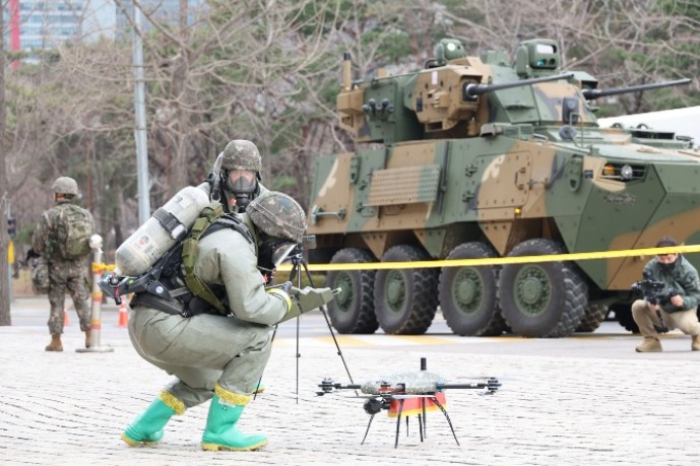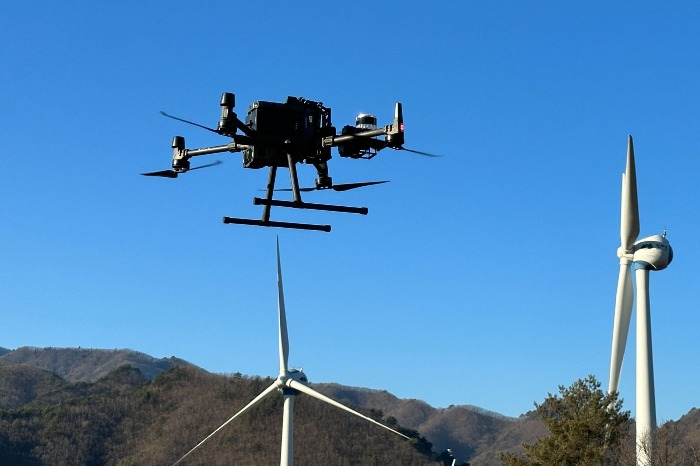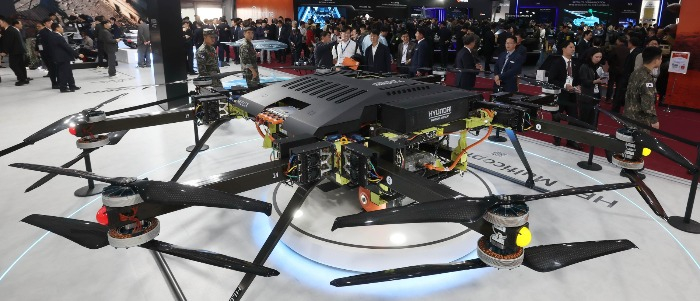Korean startups
South Korean drone startups rush to join military drone race
The global military drone market is forecast to more than double from 2023 to 2030 amid the ongoing Russia-Ukraine war
By Apr 08, 2024 (Gmt+09:00)
3
Min read
Most Read
LG Chem to sell water filter business to Glenwood PE for $692 million


KT&G eyes overseas M&A after rejecting activist fund's offer


Kyobo Life poised to buy Japan’s SBI Group-owned savings bank


StockX in merger talks with Naver’s online reseller Kream


Meritz backs half of ex-manager’s $210 mn hedge fund



South Korean drone-developing startups are rushing to join the race to develop military drones to meet growing demand for drones fit for combat operations amid the prolonged war between Russia and Ukraine.
Nearthlab, a Korean startup boasting precise flight control technology for autonomous drones, has diversified its drone portfolio by adding military drones, according to the local startup industry on Sunday.
The company has been highly regarded for its artificial intelligence-powered autonomous drone technology used in wind turbine inspection.
But it has recently developed combat drones, called drone grenades, designed to crash alien drones by colliding with them. They can fly up to 250 km/h at the point of collision.
Nearthlab said it is venturing into the military drone sector to ensure the safety of military soldiers in war zones.
This Is Engineering Inc. (TIF), an advanced air mobility technology-developing startup in Korea, also recently established a subsidiary, Shift Dynamics, which develops military drones using AI technology.
Pablo Air, a drone-delivery system-developing startup, is another Korean drone startup to throw down the gauntlet to its military drone rivals.
The Korean startups are racing to join the military drone market to meet rapidly growing demand for drones in war zones amid the protracted war between Russia and Ukraine, which started in February 2022 following Russia’s attack on its neighbor.

Reflecting the high demand, drone-developing companies in Ukraine jumped to about 200 recently from a mere 10 before the war.
According to Fortune Business Insights, the global military drone market is projected to grow to $35.6 billion in 2030 from $14.4 billion in 2023.
REGULATION RELAXATION
Amid the fierce competition to lead the market, technology leadership is critical, industry experts said.
To advance combat drone technology, it is a must to secure related military data first.
“It is easier for (drone developers) to come up with a roadmap for (military drone) technology development if access to military data is relaxed,” said Ha Yoon-cheol, R&D director of Hanwha Systems Co.
To facilitate the use of drones in combat operations and law enforcement sectors, the Korean government is also seeking to ease related regulations.

The Korean National Police Commission has recently amended unmanned aerial vehicle operation rules to allow drones to be used at protest sites to collect evidence of unlawful and offensive behavior and to monitor and detect traffic violations in real-time.
The Ministry of Land, Infrastructure and Transport and the Ministry of Science and ICT have recently opened anti-drone system drill fields to test counter-drone technologies, like jammers that force foreign flying objects such as drones to go off course or crash by interfering with radio waves.
Under current law, jamming is banned in Korea but to counter the growing risk of drone attacks by terrorists, the government has designated it lawful in certain areas for anti-drone systems testing.
To foster the local drone startup industry’s development, the Korean government has selected 17 cities and towns including Busan to facilitate drone delivery, as sites of battlefield resupply and for the drone and leisure drone businesses.
It has selected 14 startups to join the government-sponsored drone businesses.
Write to Eun-Yi Ko at koko@hankyung.com
Sookyung Seo edited this article.
More to Read
-

-
 Korean startupsS.Korea's drone market set for takeoff, led by startups
Korean startupsS.Korea's drone market set for takeoff, led by startupsMar 21, 2024 (Gmt+09:00)
5 Min read -
 Aerospace & DefenseHanwha wins S.Korean military anti-drone system deals
Aerospace & DefenseHanwha wins S.Korean military anti-drone system dealsDec 22, 2023 (Gmt+09:00)
2 Min read -
 Future mobilityHyundai’s Supernal, Kia showcase flying car, military drones at ADEX 2023
Future mobilityHyundai’s Supernal, Kia showcase flying car, military drones at ADEX 2023Oct 17, 2023 (Gmt+09:00)
4 Min read
Comment 0
LOG IN


